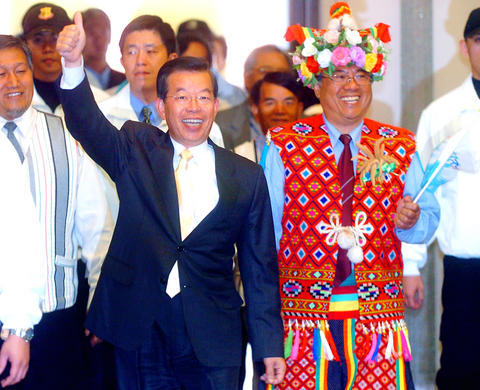Democratic Progressive Party presidential candidate Frank Hsieh (
"The commission will investigate injustices perpetrated by the government and compensate Aborigines accordingly," Hsieh told an event attended by hundreds of Aboriginal representatives.
"In addition, if elected, I will apologize to Aborigines on behalf of the government. But, first of all, I need your support," he said.

PHOTO: CHEN TSE-MING, TAIPEI TIMES
Hsieh's white paper says that Aborigines, as the earliest inhabitants of Taiwan, deserve respect. Aborigines have the right to self-determination, it says.
Hsieh said he would recognize and respect Aborigines' rights to autonomy, natural resources and property.
"I would set up Aboriginal courts in which conflicts can be resolved in accordance with traditional Aboriginal laws and customs. For example, some tribes plant bamboo to mark their territory -- this practice could be recognized in court," he said.
Hsieh promised to increase Aboriginal participation in government by requiring Aboriginal representation in institutions such as the Constitutional Court, the Control Yuan and the Examination Yuan.
He said the social welfare system also needed to be reformed.
"We should build an Aboriginal-oriented social welfare system that can actually meet Aborigines' needs," Hsieh said.
At a separate setting yesterday, Hsieh said he would establish a "single window" system to help immigrants resolve problems they encounter in Taiwan.
"Immigrants have brought pluralism to Taiwan. We should regard pluralism as an asset, not a burden. Despite differences in birthplace, we are all Taiwanese," Hsieh said.
Ministry of the Interior figures show that there are 400,000 foreign nationals residing in Taiwan, a dramatic increase from 44,000 in 1992.
If immigrants from China are counted, the figure climbs to 552,000, approximately 2.4 percent of the total population.
Hsieh said the government was obliged to provide support for new immigrants as they might experience difficulties stemming from linguistic and cultural differences.

Aftershocks from a magnitude 6.2 earthquake that struck off Yilan County at 3:45pm yesterday could reach a magnitude of 5 to 5.5, the Central Weather Administration (CWA) said. Seismological Center technical officer Chiu Chun-ta (邱俊達) told a news conference that the epicenter of the temblor was more than 100km from Taiwan. Although predicted to measure between magnitude 5 and 5.5, the aftershocks would reach an intensity of 1 on Taiwan’s 7-tier scale, which gauges the actual effect of an earthquake, he said. The earthquake lasted longer in Taipei because the city is in a basin, he said. The quake’s epicenter was about 128.9km east-southeast

The Taipei Summer Festival is to begin tomorrow at Dadaocheng Wharf (大稻埕), featuring four themed firework shows and five live music performances throughout the month, the Taipei Department of Information and Tourism said today. The festival in the city’s Datong District (大同) is to run until Aug. 30, holding firework displays on Wednesdays and the final Saturday of the event. The first show is scheduled for tomorrow, followed by Aug. 13, 20 and 30. To celebrate the 30th anniversary of Disney Pixar's movie Toy Story, the festival has partnered with Walt Disney Co (Taiwan) to host a special themed area on

BE CAREFUL: The virus rarely causes severe illness or death, but newborns, older people and those with medical conditions are at risk of more severe illness As more than 7,000 cases of chikungunya fever have been reported in China’s Guangdong Province this year, including 2,892 new cases last week, the Centers for Disease Control (CDC) yesterday said it is monitoring the situation and considering raising the travel notice level, which might be announced today. The CDC issued a level 1 travel notice, or “watch,” for Guangdong Province on July 22, citing an outbreak in Foshan, a manufacturing hub in the south of the province, that was reported early last month. Between July 27 and Saturday, the province reported 2,892 new cases of chikungunya, reaching a total of 7,716

The New Taipei City Government today warned about the often-overlooked dangers of playing in water, and recommended safe swimming destinations to cool off from the summer heat. The following locations in the city as safe and fun for those looking to enjoy the water: Chienshuiwan (淺水灣), Baishawan (白沙灣), Jhongjiao Bay (中角灣), Fulong Beach Resort (福隆海水浴場) and Sansia District’s (三峽) Dabao River (大豹溪), New Taipei City Tourism and Travel Department Director-General Yang Tsung-min (楊宗珉) said. Outdoor bodies of water have variables outside of human control, such as changing currents, differing elevations and environmental hazards, all of which can lead to accidents, Yang said. Sudden